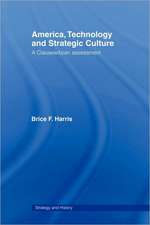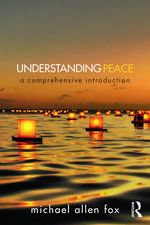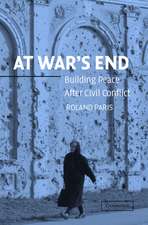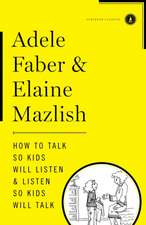Leo Strauss: Man of Peace
Autor Robert Howseen Limba Engleză Paperback – 14 sep 2014
| Toate formatele și edițiile | Preț | Express |
|---|---|---|
| Paperback (1) | 201.59 lei 6-8 săpt. | |
| Cambridge University Press – 14 sep 2014 | 201.59 lei 6-8 săpt. | |
| Hardback (1) | 635.84 lei 6-8 săpt. | |
| Cambridge University Press – 7 sep 2014 | 635.84 lei 6-8 săpt. |
Preț: 201.59 lei
Nou
Puncte Express: 302
Preț estimativ în valută:
38.58€ • 39.51$ • 32.09£
38.58€ • 39.51$ • 32.09£
Carte tipărită la comandă
Livrare economică 18 martie-01 aprilie
Preluare comenzi: 021 569.72.76
Specificații
ISBN-13: 9781107427679
ISBN-10: 1107427673
Pagini: 202
Ilustrații: black & white illustrations
Dimensiuni: 152 x 229 x 11 mm
Greutate: 0.32 kg
Editura: Cambridge University Press
Colecția Cambridge University Press
Locul publicării:New York, United States
ISBN-10: 1107427673
Pagini: 202
Ilustrații: black & white illustrations
Dimensiuni: 152 x 229 x 11 mm
Greutate: 0.32 kg
Editura: Cambridge University Press
Colecția Cambridge University Press
Locul publicării:New York, United States
Cuprins
1. Introduction: reopening the case of Leo Strauss; 2. Warrior morality and the fate of civilization: Strauss's encounter with Carl Schmitt and German nihilism; 3. Legitimacy and legality, thinking and ruling in the closed society and the world state: the Strauss/Kojève debate; 4. Strauss's Machiavelli: fallen angel and theoretical man; 5. Thucydides versus Machiavelli: a moral-political horizon of war and law; 6. Justice and progress: Strauss's assessment of modern international law; 7. Conclusion.
Recenzii
'Even if you are convinced that nothing new or provocative could possibly be said about Leo Strauss, Rob Howse's book will force you to rethink your position. Both friends and foes of Strauss will find much of interest in this fascinating reinterpretation of one of the canonical figures of twentieth-century political theory. Focusing on Strauss' ideas about political violence, the volume's most important achievement is to lay bare the fundamentals of Strauss' oftentimes neglected international political and legal theory. Strauss poses an intellectual challenge to students of international law and politics, and Howse does a wonderful job sketching out that challenge's main features.' William E. Scheuerman, Indiana University
'Robert Howse's incisive reconstruction of Leo Strauss' views on the task of political philosophy and the case for liberal democracy makes a superb contribution to the burgeoning body of scholarship on a thinker who is increasingly recognized as a towering figure of twentieth century thought. Drawing on Strauss' intellectual encounters with Carl Schmitt and Alexandre Kojeve, Strauss' interpretations of an array of major figures in the history of political philosophy, and recently released transcripts of Strauss' legendary classes at the University of Chicago, Howse shows that the question of the status of international law was integral to Strauss' philosophical explorations. Howse's book should inspire lively and illuminating debate.' Peter Berkowitz, Tad and Dianne Taube Senior Fellow, Hoover Institution, Stanford University
'As the title makes clear, this book offers the reader a very different Leo Strauss: not one committed to permanent war for the sake of preserving humanity's noble ends against degradation, but rather a profound thinker committed to peace as the only condition in which philosophy, justice and individuality can flourish. Although willing to admit that war is sometimes necessary, Howse's Strauss articulates an extra-legal and moral-political standard that can be used to judge actions taken during war. Every chapter of this book is filled with a startling number of brilliant and original insights into Leo Strauss' relationship to his contemporaries, his understanding of key texts in the history of political thought, and the character of his overall project. Howse's book will not only spark new debates about, and a renewed interest in Leo Strauss' life and works, but I am convinced that it will also become the new standard by which any books on Strauss are measured.' Christina Tarnopolsky, McGill University
'… what is undeniable is that Howse has produced the clearest articulation of the fundamental role that 'the international' occupies in Strauss' thought. … Howse has done all of us a great service by writing this book.' Michael N. Di Gregorio, E-International Relations
'Robert Howse's Leo Strauss: Man of Peace is an effort to rehabilitate Strauss without supporting those whom he terms the 'Straussians' … [b]ut beyond Howse's meditations on Strauss, war and peace … thoughtful, inventive and well-argued … [this] book also makes an important contribution by inquiring into Strauss' views on philosophers and political life.' Benjamin Aldes Wurgaft, Los Angeles Review of Books
'In Leo Strauss: Man of Peace, the New York University law professor Robert Howse, with the blessing of the Straussian faithful … seeks to set the record straight … [w]hat we gain from Howse's reinterpretation of Strauss's views in light of casual remarks that Strauss made in his lectures and seminars is a slightly more capacious view of Strauss as a theorist of international relations.' Richard Wolin, The Chronicle of Higher Education
'In his own contribution to this discussion, Howse seeks to understand Strauss as Strauss understood himself (to borrow a venerable Straussian precept). He is thus preoccupied with Strauss' writings, lectures and letters. Like previous authors plowing these fields, however, Howse is also interested to some extent in the phenomenon of the Strauss 'cult' - that is, the fervent, often-cliquish group of Straussian teachers and students whose devotion to the Straussian 'project' has now stretched over several generations.' Gary Rosen, The National Interest
'Robert Howse's incisive reconstruction of Leo Strauss' views on the task of political philosophy and the case for liberal democracy makes a superb contribution to the burgeoning body of scholarship on a thinker who is increasingly recognized as a towering figure of twentieth century thought. Drawing on Strauss' intellectual encounters with Carl Schmitt and Alexandre Kojeve, Strauss' interpretations of an array of major figures in the history of political philosophy, and recently released transcripts of Strauss' legendary classes at the University of Chicago, Howse shows that the question of the status of international law was integral to Strauss' philosophical explorations. Howse's book should inspire lively and illuminating debate.' Peter Berkowitz, Tad and Dianne Taube Senior Fellow, Hoover Institution, Stanford University
'As the title makes clear, this book offers the reader a very different Leo Strauss: not one committed to permanent war for the sake of preserving humanity's noble ends against degradation, but rather a profound thinker committed to peace as the only condition in which philosophy, justice and individuality can flourish. Although willing to admit that war is sometimes necessary, Howse's Strauss articulates an extra-legal and moral-political standard that can be used to judge actions taken during war. Every chapter of this book is filled with a startling number of brilliant and original insights into Leo Strauss' relationship to his contemporaries, his understanding of key texts in the history of political thought, and the character of his overall project. Howse's book will not only spark new debates about, and a renewed interest in Leo Strauss' life and works, but I am convinced that it will also become the new standard by which any books on Strauss are measured.' Christina Tarnopolsky, McGill University
'… what is undeniable is that Howse has produced the clearest articulation of the fundamental role that 'the international' occupies in Strauss' thought. … Howse has done all of us a great service by writing this book.' Michael N. Di Gregorio, E-International Relations
'Robert Howse's Leo Strauss: Man of Peace is an effort to rehabilitate Strauss without supporting those whom he terms the 'Straussians' … [b]ut beyond Howse's meditations on Strauss, war and peace … thoughtful, inventive and well-argued … [this] book also makes an important contribution by inquiring into Strauss' views on philosophers and political life.' Benjamin Aldes Wurgaft, Los Angeles Review of Books
'In Leo Strauss: Man of Peace, the New York University law professor Robert Howse, with the blessing of the Straussian faithful … seeks to set the record straight … [w]hat we gain from Howse's reinterpretation of Strauss's views in light of casual remarks that Strauss made in his lectures and seminars is a slightly more capacious view of Strauss as a theorist of international relations.' Richard Wolin, The Chronicle of Higher Education
'In his own contribution to this discussion, Howse seeks to understand Strauss as Strauss understood himself (to borrow a venerable Straussian precept). He is thus preoccupied with Strauss' writings, lectures and letters. Like previous authors plowing these fields, however, Howse is also interested to some extent in the phenomenon of the Strauss 'cult' - that is, the fervent, often-cliquish group of Straussian teachers and students whose devotion to the Straussian 'project' has now stretched over several generations.' Gary Rosen, The National Interest
Notă biografică
Descriere
This book analyzes Leo Strauss's writings on political violence, considering also what he taught in the classroom on this subject.













